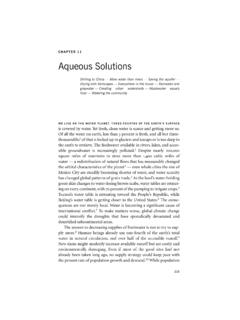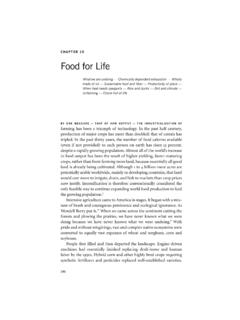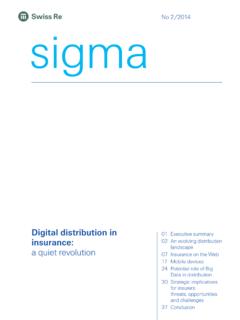Transcription of CHAPTER 1 The Next Industrial Revolution
1 26476 01 p001-169 r4ah 9/10/99 5:49 PM Page 1. CHAPTER 1 1. 2. 3. The next Industrial Revolution 4. 5. Emerging possibilities A new type of industrialism The loss of 6. living systems Valuing natural capital The Industrial mind-set 7. The emerging pattern of scarcity Four strategies of natural capital- 8. ism Radical resource productivity Putting the couch potato of industrialism on a diet An economy of steady service and flow . 9. Restoring the basis of life and commerce 10. 11. 12. 13. 14. IMAGINE FOR A MOMENT A WORLD WHERE CITIES HAVE BECOME PEACEFUL 15. and serene because cars and buses are whisper quiet, vehicles exhaust 16. only water vapor, and parks and greenways have replaced unneeded 17. urban freeways. OPEC has ceased to function because the price of oil 18. has fallen to five dollars a barrel, but there are few buyers for it because 19.
2 Cheaper and better ways now exist to get the services people once 20. turned to oil to provide. Living standards for all people have dramati- 21. cally improved, particularly for the poor and those in developing coun- 22. tries. Involuntary unemployment no longer exists, and income taxes 23. have largely been eliminated. Houses, even low-income housing units, 24. can pay part of their mortgage costs by the energy they produce; there 25. are few if any active landfills; worldwide forest cover is increasing; dams 26. are being dismantled; atmospheric CO2 levels are decreasing for the 27. first time in two hundred years; and effluent water leaving factories is 28. cleaner than the water coming into them. Industrialized countries have 29. reduced resource use by percent while improving the quality of life. 30. Among these technological changes, there are important social changes.
3 31. The frayed social nets of Western countries have been repaired. With 32. the explosion of family-wage jobs, welfare demand has fallen. A pro- 33. gressive and active union movement has taken the lead to work with 34. business, environmentalists, and government to create just transi- 35. tions for workers as society phases out coal, nuclear energy, and oil. In 36. communities and towns, churches, corporations, and labor groups pro- 37. mote a new living-wage social contract as the least expensive way to 38 S. ensure the growth and preservation of valuable social capital. Is this the 39 R. 1. 26476 01 p001-169 r4ah 9/10/99 5:49 PM Page 2. 2 N AT U R A L C A P I TA L I S M. 1 vision of a utopia? In fact, the changes described here could come about 2 in the decades to come as the result of economic and technological 3 trends already in place.
4 4 This book is about these and many other possibilities. 5 It is about the possibilities that will arise from the birth of a new 6 type of industrialism, one that differs in its philosophy, goals, and fun- 7 damental processes from the Industrial system that is the standard 8 today. In the next century, as human population doubles and the 9 resources available per person drop by one-half to three-fourths, a 10 remarkable transformation of industry and commerce can occur. 11 Through this transformation, society will be able to create a vital econ- 12 omy that uses radically less material and energy. This economy can free 13 up resources, reduce taxes on personal income, increase per-capita 14 spending on social ills (while simultaneously reducing those ills), and 15 begin to restore the damaged environment of the earth. These neces- 16 sary changes done properly can promote economic efficiency, ecologi- 17 cal conservation, and social equity.
5 18 The Industrial Revolution that gave rise to modern capitalism greatly 19 expanded the possibilities for the material development of human- 20 kind. It continues to do so today, but at a severe price. Since the mid- 21 eighteenth century, more of nature has been destroyed than in all prior 22 history. While Industrial systems have reached pinnacles of success, able 23 to muster and accumulate human-made capital on vast levels, natural 24 capital, on which civilization depends to create economic prosperity, is 25 rapidly declining,1 and the rate of loss is increasing proportionate to 26 gains in material well-being. Natural capital includes all the familiar 27 resources used by humankind: water, minerals, oil, trees, fish, soil, air, et 28 cetera. But it also encompasses living systems, which include grass- 29 lands, savannas, wetlands, estuaries, oceans, coral reefs, riparian corri- 30 dors, tundras, and rainforests.
6 These are deteriorating worldwide at 31 an unprecedented rate. Within these ecological communities are the 32 fungi, ponds, mammals, humus, amphibians, bacteria, trees, flagellates, 33 insects, songbirds, ferns, starfish, and flowers that make life possible 34 and worth living on this planet. 35 As more people and businesses place greater strain on living sys- 36 tems, limits to prosperity are coming to be determined by natural capi- 37 tal rather than Industrial prowess. This is not to say that the world is S 38 running out of commodities in the near future. The prices for most raw R 39 materials are at a twenty-eight-year low and are still falling. Supplies are 26476 01 p001-169 r4ah 9/10/99 5:49 PM Page 3. T H E N E X T I N D U S T R I A L R E V O LU T I O N 3. cheap and appear to be abundant, due to a number of reasons: the col- 1.
7 Lapse of the Asian economies, globalization of trade, cheaper transport 2. costs, imbalances in market power that enable commodity traders and 3. middlemen to squeeze producers, and in large measure the success of 4. powerful new extractive technologies, whose correspondingly extensive 5. damage to ecosystems is seldom given a monetary value. After richer 6. ores are exhausted, skilled mining companies can now level and grind 7. up whole mountains of poorer-quality ores to extract the metals 8. desired. But while technology keeps ahead of depletion, providing what 9. appear to be ever-cheaper metals, they only appear cheap, because the 10. stripped rainforest and the mountain of toxic tailings spilling into 11. rivers, the impoverished villages and eroded indigenous cultures all 12. the consequences they leave in their wake are not factored into the 13.
8 Cost of production. 14. It is not the supplies of oil or copper that are beginning to limit our 15. development but life itself. Today, our continuing progress is restricted 16. not by the number of fishing boats but by the decreasing numbers of 17. fish; not by the power of pumps but by the depletion of aquifers; not by 18. the number of chainsaws but by the disappearance of primary forests. 19. While living systems are the source of such desired materials as wood, 20. fish, or food, of utmost importance are the services that they offer,2 ser- 21. vices that are far more critical to human prosperity than are nonrenew- 22. able resources. A forest provides not only the resource of wood but also 23. the services of water storage and flood management. A healthy envi- 24. ronment automatically supplies not only clean air and water, rainfall, 25.
9 Ocean productivity, fertile soil, and watershed resilience but also such 26. less-appreciated functions as waste processing (both natural and indus- 27. trial), buffering against the extremes of weather, and regeneration of 28. the atmosphere. 29. Humankind has inherited a . -billion-year store of natural capital. 30. At present rates of use and degradation, there will be little left by the 31. end of the next century. This is not only a matter of aesthetics and 32. morality, it is of the utmost practical concern to society and all people. 33. Despite reams of press about the state of the environment and rafts of 34. laws attempting to prevent further loss, the stock of natural capital is 35. plummeting and the vital life-giving services that flow from it are criti- 36. cal to our prosperity. 37. Natural capitalism recognizes the critical interdependency between 38 S.
10 The production and use of human-made capital and the maintenance 39 R. 26476 01 p001-169 r4ah 9/10/99 5:49 PM Page 4. 4 N AT U R A L C A P I TA L I S M. 1 and supply of natural capital. The traditional definition of capital is 2 accumulated wealth in the form of investments, factories, and equip- 3 ment. Actually, an economy needs four types of capital to function 4 properly: 5. 6.. human capital, in the form of labor and intelligence, culture, and organization 7 . financial capital, consisting of cash, investments, and monetary instruments 8 . manufactured capital, including infrastructure, machines, tools, and factories 9 . natural capital, made up of resources, living systems, and ecosystem services 10. 11 The Industrial system uses the first three forms of capital to transform 12 natural capital into the stuff of our daily lives: cars, highways, cities, 13 bridges, houses, food, medicine, hospitals, and schools.







